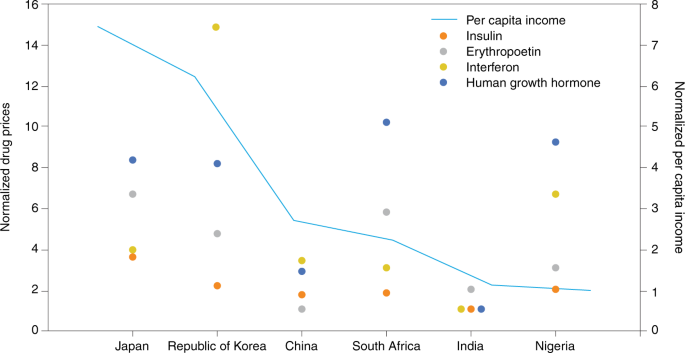
- Select a language for the TTS:
- UK English Female
- UK English Male
- US English Female
- US English Male
- Australian Female
- Australian Male
- Language selected: (auto detect) - EN
Play all audios:
Access through your institution Buy or subscribe TO THE EDITOR — Although unsustainable pricing of biologic drugs has generated considerable controversy in recent years, comparatively little
discussion has centered on accessibility and affordability of innovative medicines in emerging nations. In general, the percentage of patients able to access innovative therapies is much
lower in emerging economies than in developed countries; for example, percentage of patients with access to MabThera (rituximab) in Brazil is one-third that in the UK and one-sixth that in
the United States, even though the population of Brazil is more than threefold that of the UK and only slightly smaller than that of the United States1. This discrepancy in access is
particularly pronounced for biologic drugs; for example, only 20% of patients with autoimmune conditions in emerging markets have access to anti-tumor necrosis factor-α biologics. (Access
varies from 29% in China to 12% in Russia and a mere 6% in Brazil.2) What factors lie behind access to biologics in emerging economies, and how are these related to affordability? Here we
survey the prices of biologic drugs across several emerging nations. We show that the presence of domestic manufacturing capabilities translates into high competition and low prices for
biologic drugs for patients in that market; in contrast, emerging countries lacking manufacturing capabilities have no means for diversifying drug provision and insufficient competition to
drive down prices. To address these factors, emerging nations must either build their own manufacturing capabilities or put in place regulatory processes that make it easy for manufacturers
elsewhere (especially from other emerging nations) to enter their market. This is a preview of subscription content, access via your institution RELEVANT ARTICLES Open Access articles citing
this article. * BIOPHARMACEUTICAL INDUSTRY CAPABILITY BUILDING IN INDIA: REPORT FROM A SYMPOSIUM * Annu Uppal * , Ranjan Chakrabarti * … Fouad Atouf _Journal of Pharmaceutical Innovation_
Open Access 26 November 2021 ACCESS OPTIONS Access through your institution Access Nature and 54 other Nature Portfolio journals Get Nature+, our best-value online-access subscription $29.99
/ 30 days cancel any time Learn more Subscribe to this journal Receive 12 print issues and online access $209.00 per year only $17.42 per issue Learn more Buy this article * Purchase on
SpringerLink * Instant access to full article PDF Buy now Prices may be subject to local taxes which are calculated during checkout ADDITIONAL ACCESS OPTIONS: * Log in * Learn about
institutional subscriptions * Read our FAQs * Contact customer support CHANGE HISTORY * _ 01 NOVEMBER 2019 An amendment to this paper has been published and can be accessed via a link at the
top of the paper. _ REFERENCES * McKinsey. Biosimilars seven years on: where are we and what’s next?
https://www.mckinsey.com/~/media/mckinsey/dotcom/client_service/Pharma%20and%20Medical%20Products/PMP%20NEW/PDFs/Biosimilars%20Seven%20years%20on_White%20Paper.ashx (2013). * Gross, H. J.
& Vietri, F. _Barriers to Biologic Therapy Use for Autoimmune Disorders in Emerging Markets, International Society for Pharmacoeconomics and Outcomes Research_: _16th Annual European
Conference_ (2013). * Ghosh, A., Ray, S., Dewan, S., Shah, K. & Sahani, K. _Indian Pharmaceutical Sector_ (ICRA Ltd., New Delhi, 2012). Google Scholar * Pharmaceutical Export Promotion
Council of India. _11th Annual Report, 2014–2015_ (Government of India, Bangalore, India, 2015). Google Scholar * Edney, A. & Mittelman, M. Valeant, Turing would face subpoena vote
under Democrat’s plan. _Bloomberg_ http://www.bloomberg.com/news/articles/2015-11-04/valeant-turing-would-face-subpoena-vote-under-democrats-plan (4 November 2015). * Kateja, N., Agarwal,
H., Hebbi, V. & Rathore, A. S. _Biotechnol. Prog._ 33, 998–1009 (2017). Article CAS Google Scholar Download references AUTHOR INFORMATION AUTHORS AND AFFILIATIONS * Indian Institute
of Technology Delhi, Department of Chemical Engineering, New Delhi, India Anurag S. Rathore & Faheem Shereef Authors * Anurag S. Rathore View author publications You can also search for
this author inPubMed Google Scholar * Faheem Shereef View author publications You can also search for this author inPubMed Google Scholar CORRESPONDING AUTHOR Correspondence to Anurag S.
Rathore. ETHICS DECLARATIONS COMPETING INTERESTS The authors declare no competing interests. RIGHTS AND PERMISSIONS Reprints and permissions ABOUT THIS ARTICLE CITE THIS ARTICLE Rathore,
A.S., Shereef, F. The influence of domestic manufacturing capabilities on biologic pricing in emerging economies. _Nat Biotechnol_ 37, 498–501 (2019).
https://doi.org/10.1038/s41587-019-0116-0 Download citation * Published: 03 May 2019 * Issue Date: May 2019 * DOI: https://doi.org/10.1038/s41587-019-0116-0 SHARE THIS ARTICLE Anyone you
share the following link with will be able to read this content: Get shareable link Sorry, a shareable link is not currently available for this article. Copy to clipboard Provided by the
Springer Nature SharedIt content-sharing initiative





:max_bytes(150000):strip_icc():focal(734x339:736x341)/spike-lee-glenn-close-ab1259d23d1448af8942a6dccda2e318.jpg)

